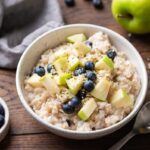Vitamin D is an essential nutrient playing a crucial role in maintaining overall health, most notably in supporting strong bones and a robust immune system. While sunlight is a primary source of vitamin D, certain foods can also significantly contribute to your daily intake. For those looking to increase their vitamin D levels through diet, understanding which foods are rich in this vital vitamin is key. This guide will explore the top food sources of vitamin D, helping you make informed choices to enhance your health.
Why is Vitamin D Important?
Before diving into the foods, it’s important to understand why vitamin D is so critical. Vitamin D is a fat-soluble vitamin that helps the body absorb calcium, which is essential for bone health. Beyond bone health, vitamin D is also vital for immune function, muscle function, and cell growth. Research has explored vitamin D’s role in regulating the immune system, investigating its potential impact on autoimmune diseases and infectious diseases.
For instance, studies have shown a correlation between vitamin D levels and conditions like multiple sclerosis (MS). Geographical studies have noted higher rates of MS in regions farther from the equator, suggesting a link between sunlight exposure and the disease. Similarly, research into type 1 diabetes has indicated that vitamin D might play a role in its development, although findings have been mixed and require further investigation. Vitamin D’s influence on the immune system has also been studied in relation to respiratory infections, including the flu and common cold, with some studies suggesting a potential benefit of vitamin D supplementation in reducing the risk of acute respiratory infections.
While supplementation is a route to increase vitamin D, incorporating vitamin D-rich foods into your diet is a natural and beneficial approach.
Top Food Sources of Vitamin D
Fortunately, there are several delicious and accessible foods that can help you meet your daily vitamin D requirements. Here are some of the top food sources to include in your diet:
Fatty Fish
Fatty fish are among the best natural sources of vitamin D. Types like salmon, mackerel, tuna, and sardines are packed with vitamin D, as well as omega-3 fatty acids and other beneficial nutrients.
-
Salmon: A serving of salmon can provide a substantial amount of your daily vitamin D. Wild-caught salmon generally contains more vitamin D than farmed salmon.
-
Mackerel: This oily fish is not only rich in vitamin D but also a good source of vitamin B12 and selenium.
-
Tuna: Canned tuna is a more affordable and readily available option to incorporate vitamin D into your diet. However, it’s important to consume it in moderation due to potential mercury levels.
-
Sardines: These small, nutrient-dense fish are an excellent source of vitamin D, calcium, and omega-3s.
Egg Yolks
Eggs are a versatile and widely consumed food, and their yolks are a source of vitamin D. The vitamin D in eggs comes from the chicken feed and sun exposure.
- While egg whites are prized for protein, the vitamin D is exclusively found in the yolk. Including whole eggs in your diet can contribute to your vitamin D intake.
Mushrooms
Mushrooms are unique in the plant kingdom as they can produce vitamin D when exposed to UV light. Similar to humans, mushrooms synthesize vitamin D when exposed to sunlight or UV lamps.
- Specifically, mushrooms exposed to UV light can be a good source of vitamin D2. Look for mushrooms that are labeled as UV-treated to ensure they contain vitamin D.
Fortified Foods
Fortification is the process of adding nutrients to foods that don’t naturally contain them, or contain them in insignificant amounts. Many foods are fortified with vitamin D to help increase population intake.
-
Milk: Cow’s milk is often fortified with vitamin D. Check the nutrition label to confirm the vitamin D content.
-
Plant-Based Milk Alternatives: Soy milk, almond milk, and other plant-based milk alternatives are frequently fortified with vitamin D, making them suitable options for vegans and those with dairy intolerance.
-
Cereals and Oatmeal: Many breakfast cereals and instant oatmeal are fortified with vitamin D. These can be a convenient way to start your day with a boost of vitamin D.
-
Orange Juice: Some brands of orange juice are fortified with vitamin D and calcium.
-
Yogurt: Fortified yogurt can also contribute to your vitamin D intake.
Cod Liver Oil
While technically a supplement, cod liver oil is a natural food-derived source of vitamin D. It’s also extremely high in vitamin A and omega-3 fatty acids.
- Due to its high vitamin A content, cod liver oil should be consumed in moderation. It’s best to follow recommended dosages if using it as a supplement.
Incorporating Vitamin D Foods into Your Diet
Making sure you get enough vitamin D through your diet is achievable by including a variety of these foods regularly. Here are some tips:
- Plan your meals: Incorporate fatty fish into your diet a couple of times a week. Use eggs in breakfasts or other meals. Choose fortified foods like milk and cereals.
- Read labels: When purchasing fortified foods, check the nutrition labels to ensure they contain vitamin D and to understand the amount per serving.
- Variety is key: Eating a variety of vitamin D-rich foods will not only help you meet your vitamin D needs but also provide a range of other essential nutrients.
- Consider your needs: Factors like skin pigmentation, geographic location, and overall health can influence your vitamin D requirements. Consult with a healthcare provider to determine your specific needs.
Conclusion
While sunlight remains a primary source of vitamin D, incorporating Foods That Have Vitamin D into your diet is a practical and effective way to boost your levels of this crucial nutrient. By including fatty fish, egg yolks, UV-treated mushrooms, and fortified foods in your regular meals, you can support your bone health, immune function, and overall well-being. Remember to maintain a balanced diet and consult with healthcare professionals for personalized advice on vitamin D intake.

